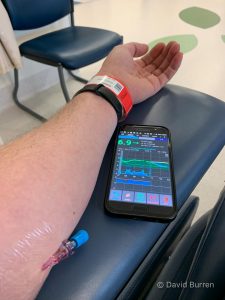Remember yesterday’s article with the hypothetical question about which I would get rid of if I could (diabetes or coeliac disease)? I’ve been getting a variety of feedback from readers, fairly evenly split between choosing one or the other.
But what if it wasn’t just hypothetical?
Research is being done in both arenas on finding cures. Note that to me a “cure” is something that reverses a condition. Prevention is not a cure for those people who have the condition already. What if one day practical cures were available? They’re not yet (I don’t consider a pancreas transplant practical for me yet, given the immune rejection issues).
But an opportunity did come my way to help with the development of one!
A possible “cure”?
I am now a participant in a clinical trial of a therapeutic vaccine for coeliac disease. Note that unlike regular vaccines which are all about protection against developing a condition, a “therapeutic vaccine” is targeted at changing your body’s immune response to an existing issue. So it is a cure! Hopefully, at least.
The trial I’m participating in is for an experimental vaccine called Nexvax2. For anyone interested in the details of the trial, the trial identifier is NCT03644069 (ClinicalTrials.gov website).
This is a Phase II trial, with 146 participants (spread across the US, Australia, and NZ). As a crude summary: a Phase I drug trial is usually establishing the safety and basic efficacy, Phase II is about efficacy and dosage, and Phase III refines things before they go to market. I expect that what they learn from this one will probably result in a Phase III trial. They’ll be refining dosage, frequency of boosters, etc. There have been three Phase I trials of Nexvax2: 34 people in 2009-2010, then 38 people in 2015-2017, then 14 in 2018. Now this 146-person Phase II trial.
So I expect it’ll still be a few years before they get anything to the market. But if they don’t get people to do the trials then they won’t get it through the regulators/etc…
What’s involved

In this trial there will be a course of twice-weekly injections for about four months. My participation in the trial will be over by September, so that’s quite a lengthy process, with many visits to the hospital. Luckily I’m enrolled in a study centre that’s walking distance from my house! Along the way there will be various tests, including blood draws, gastroscopies, and food “challenges” (some of which will involve gluten). But other than those challenges, I have to maintain my gluten-free diet.
Other than the diabetes technology I already use, the only “tech” involved in this trial are a PDA (actually a Nexus 5 phone with custom software) which I have to enter data into, and auto-injectors which I’ll be given later for the at-home injections.
To be accepted into the trial I needed to pass a bunch of eligibility criteria, including genetic testing (the vaccine doesn’t work for every genetic variation that results in coeliac disease, although I suspect it matches the majority). Unfortunately I won’t know whether I’m receiving the actual drug or a placebo (there’s a blinded 50:50 distribution for my genetic group).
So what do I get?
Just to make it clear, I don’t get any money. Assuming I make it all the way through the trial, what will I end up with? There seem to be three major options.
At the end, if I’ve received the placebo then obviously there’s no direct benefit to me. I won’t have changed my immune response to gluten. I will have gone through some “hardship” (such as the gluten challenges) so overall I could think of myself as “having gone backwards”. But I will hopefully have helped prove that the vaccine does work in other people, and thus helped move it closer to being available for people with coeliac disease.
If I have received the actual drug and it didn’t work for me, at least that will be useful information for the researchers.
What about if I have received the actual drug and it did work for me? For a while I’d be able to eat gluten-containing food, and this would be great. But unfortunately no, I can not expect to be cured. Like many other vaccines, the expectation is that boosters will be required. But they haven’t yet established how long that would be.
I suppose I could decide to treat myself as cured, and indeed I might become a little lax about the strictness of my GF diet. But at some point the gluten reaction would presumably return and the damage to my body would start again. Quite understandably, the medical advice is that I should not regard it as a cure and I should maintain my GF diet. I will have to decide what path I follow. Of course that’s assuming that I end up with a positive outcome at the end of the trial!
I will have received some short-term benefit for my coeliac disease, but the major benefit will be helping to bring the treatment one step closer to being available to everyone (including me).
So far I’ve only had a few study visits. But I’ll probably mention some details and stories across the coming months!

